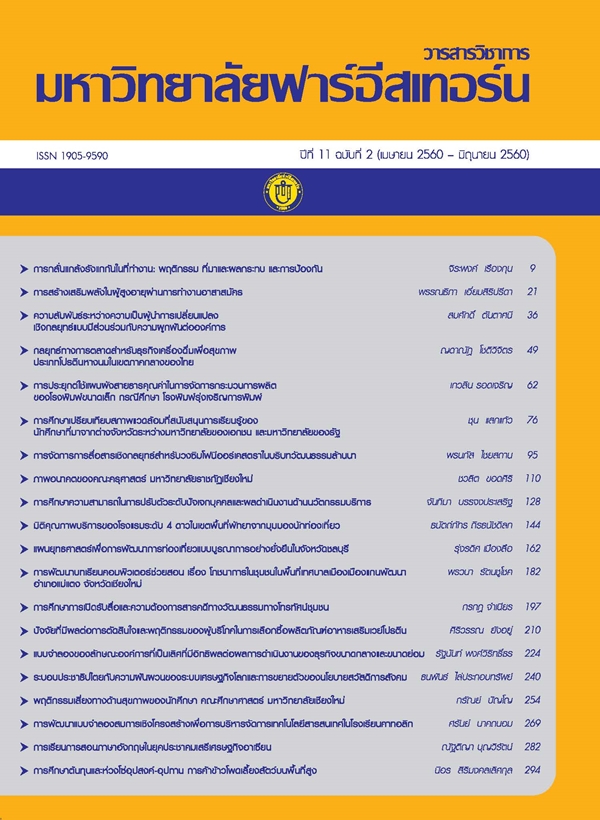ภาพอนาคตของคณะครุศาสตร์ มหาวิทยาลัยราชภัฏเชียงใหม่
Main Article Content
Abstract
การวิจัยครั้งนี้มีความมุง่ หมายเพื่อ 1) ศึกษาความเปน็ มา สภาพอดีตและปจั จุบันของคณะครุศาสตร์
มหาวิทยาลัยราชภัฏเชียงใหม่ 2) ศึกษาวิเคราะห์บริบทขององค์ประกอบต่าง ๆ เพื่อจัดทำร่างภาพอนาคต
ของคณะครุศาสตร์ มหาวิทยาลัยราชภัฏเชียงใหม่ 3) ศึกษาความเป็นไปได้ของภาพอนาคตของคณะครุศาสตร์
มหาวิทยาลัยราชภัฏเชียงใหม่ และ 4) ยืนยันภาพอนาคตของคณะครุศาสตร์ มหาวิทยาลัยราชภัฏเชียงใหม่
ในทศวรรษหน้า (พ.ศ. 2569) โดยวิธีการจัดเวทีประชาคม ดำเนินการวิจัยด้วยเทคนิคเดลฟายแบบปรับปรุง
บุคคลเป้าหมาย ประกอบด้วย กลุ่มผู้ใช้บัณฑิต กลุ่มผู้บริหารมหาวิทยาลัย กลุ่มผู้ผลิตบัณฑิต
กลุ่มผู้ทรงคุณวุฒิภายนอก และกลุ่มผู้แทนประชาชน
ผลการวิจัยปรากฏดังนี้
1. ด้านการจัดการเรียนการสอนจะต้องมีการจัดการเรียนการสอนผสมผสานการใช้สื่อดิจิทัล
ที่ทันสมัยและเหมาะสม อันประกอบด้วยสื่อที่ประดิษฐ์ขึ้นเองและสื่อที่ถูกพัฒนาจากระบบเทคโนโลยี
สารสนเทศ มีระบบการเรียนการสอนออนไลน์ มีแอพพลิเคชั่นรายวิชาที่พัฒนาขึ้นมาใหม่ มีตำรา หนังสือ
และเอกสารประกอบการสอนที่สนองตอบกับผู้เรียนจำนวนมาก มีการเพิ่มหลักสูตรใหม่ ๆ ที่สนองต่อ
ความต้องการของท้องถิ่น ประเทศ และนานาชาติ
2. ด้านการวิจัย จะต้องมีการวิจัยเพื่อพัฒนาหลักสูตร การวิจัยระดับสถาบัน การวิจัยระดับประเทศ
เพื่อการจัดการเรียนการสอนให้มีประสิทธิภาพ มีการนำงานวิจัยมาใช้ในการทำเอกสารประกอบการสอน
ตำรา หนังสือ หรือผลงานอื่น ๆ ตลอดจนมีการบูรณาการการเรียนการสอนกับงานวิจัย เพื่อแก้ไขปัญหาและ
การพัฒนาท้องถิ่นอย่างยั่งยืน มุ่งสร้างองค์ความรู้ใหม่ และแสวงหาแนวทางในการสร้างเครือข่ายการวิจัย
ในระดับท้องถิ่น ประเทศ และนานาชาติ สอดรับกับนโยบายของรัฐบาล แผนพัฒนาเศรษฐกิจและสังคม
แห่งชาติ แผนการศึกษาแห่งชาติ นโยบายกระทรวงศึกษาธิการ กรอบการวิจัยของสำนักงานคณะกรรมการ
วิจัยแห่งชาติ (วช.) และยุทธศาสตร์ของมหาวิทยาลัย
3. ด้านการบริการวิชาการ จะต้องมีการพัฒนาศักยภาพด้านเทคโนโลยีสารสนเทศ การสื่อสาร
และนวัตกรรมเพื่อเข้าสู่โมเดลการพัฒนาประเทศไทย Thailand 4.0 โดยผลักดันไทยสู่ผู้นำด้านเศรษฐกิจ
ที่ขับเคลื่อนด้วยนวัตกรรม (Value-Based Economy) เป็นศูนย์ความเป็นเลิศด้านการผลิต-พัฒนาครู
และบุคลากรทางการศึกษา ศูนย์ฝึกอบรมและพัฒนาทรัพยากรมนุษย์ของผู้นำองค์กร ศูนย์ความเป็นเลิศ
ด้านการพัฒนาเศรษฐกิจและเทคโนโลยีชุมชนแห่งเอเชีย ศูนย์ความเป็นเลิศการศึกษาและพัฒนาศักยภาพ
ผู้สูงอายุ และศูนย์เรียนรู้หลักปรัชญาของเศรษฐกิจพอเพียงแบบครบวงจร
4. ด้านการทำนุบำรุงศิลปวัฒนธรรม จะต้องร่วมมือกับองค์กรปกครองส่วนท้องถิ่น องค์กรภาครัฐ
และเอกชนทั้งในระดับท้องถิ่น ประเทศ และนานาชาติ เพื่อส่งเสริม สนับสนุน ศิลปวัฒนธรรมเพื่อให้เป็น
ที่รู้จักในเวทีระดับชาติและเวทีโลกมากขึ้น
5. ด้านการบริหารจัดการการศึกษาสมัยใหม่ จะต้องมีการบริหารตามหลักธรรมาภิบาล มีกลไก
ตรวจสอบได ้กระบวนการเขา้ สูอ่ ำนาจการตรวจสอบ ความโปรง่ ใส การกระจายอำนาจ ทุกคนมีส่วนร่วมอย่างแท้จริง
The purposes of this research were to 1) examine past and current circumstances of the
Faculty of Education, Chiang Mai Rajabhat University; 2 ) investigate and analyze its contextual
factors in order to draft its future scenario; 3) study its likely future scenario, and 4) reaffirm the more
likely future scenario of the faculty available in the next decade (B.E. 2569) via public discussion
forum. Modified Delphi Technique was employed to conduct the research. The focused groups
consisted of groups of interpreters, university administrators, academic and supportive staff involved
in the graduate production, external university experts and public representatives.
The research findings revealed as follows:
1. In terms of instructional management, blended learning should be appropriately
implemented and combined with new digital media consisting of both the developed media from
Information Technology and the newly invented media. Online-learning system, newly developed
syllabus applications, books, textbooks, and supplementary teaching materials should be
provided to responding a massive amount of learners. New curriculum should be additionally
produced for responding the local, national, and international needs.
2. In terms of research studies, researches should be carried out to develop curriculum;
moreover, both academic and national researches should be conducted to manage instructions
effectively. Research findings should be not only applied to producing supplementary teaching
materials, textbooks, books, or other work productivities, but also integrated into instructional
approaches in order to solve problems and develop sustainable communities. All researches should
aim to create a new body of knowledge and seek for establishing research networks in all the local,
national, and international levels; as well as, the researches should be conducted in accordance
with government policies, economic and social development plan, national education plan, education
policies, research conceptual frameworks of National Research Council, and university strategies.
3. In terms of academic services, the potentials of Information Technology, communication,
and innovation should be developed into a New Development Model of Thailand (4.0) by driving
Thailand to become a leader of Value-Based Economy and a center of excellence in development
and production of teachers and educational personnel, training and human resource development
of organizational leaders, Asian development for community economy and technology, education
and development of ageing people, and integrated learning of sufficiency economic philosophy.
4. In terms of arts and cultural preservation, the faculty should work in collaboration with
local government organizations and government and private organizations in all the local, national,
and international levels to support and promote Thai arts and cultures with greater recognition on
the international and global stages.
5. In terms of modern education management, systems and mechanisms that people can
participate in every partnership should be established for determining the management of the
principles of good governance, empowerment, transparency, and decentralization.
Article Details
1. Any views and comments in the Journal of Social Innovation and Lifelong Learning are the authors’ views. The editorial staff have not to agree with those views and it is not considered as the editorial’s responsibility.
2. The responsibility of content and draft check of each article belongs to each author. In case, there is any lawsuit about copyright infringement. It is considered as the authors’ sole responsibility.
3. The article copyright belonging to the authors and The Far Eastern University are copyrighted legally. Republication must be received direct permission from the authors and The Far Eastern University in written form.
References
กฤษณพงศ์ กีรติกร. (2557). การยกระดับคุณภาพครู. ใน การประชุมคณะกรรมการปฏิรูประบบผลิตและพัฒนาครู ครั้งที่ 2/2557 วันที่ 24 มกราคม 2557 ณ ห้องประชุมสำนักพัฒนาสมรรถนะครูและบุคลากรอาชีวศึกษา.
ดิเรก พรสีมา. (2555). มาตรฐานวิชาชีพครูอาเซียน. [เอกสารอัดสำเนา]. ใน เอกสารประกอบการประชุมสภาครูอาเซียน ครั้งที่ 28 วันที่ 7–11 ธันวาคม 2555 ณ โรงแรมอินนา แกรนด์ บาหลี บีช, ซานูร์, บาหลี ประเทศอินโดนีเซีย. ม.ป.ท.
ถนอม อินทรกำเนิด. (2544). กระบวนทัศน์ใหม่ของราชภัฏ. ม.ป.ท.
ประเวศ วะสี. (2552). คำบรรยายเรื่องการศึกษาที่พาชาติออกจากวิกฤติ. กรุงเทพฯ: มหาวิทยาลัยธุรกิจบัณฑิตย์.
พฤทธิ์ ศิริบรรณพิทักษ์. (2546). รายงานการวิจัยเพื่อพัฒนานโยบายและแผนการปฏิรูปการผลิตและพัฒนาครู คณาจารย์ และบุคลากรทางการศึกษา. กรุงเทพฯ: สำนักงานคณะกรรมการการศึกษาแห่งชาติ.
ไพฑูรย์ สินลารัตน์. (2557). หลักและเทคนิคการสอนระดับอุดมศึกษา. กรุงเทพฯ: สำนักพิมพ์แห่งจุฬาลงกรณ์ มหาวิทยาลัย.
มนัส สุวรรณ และคณะ. (2546). รายงานการวิจัยเรื่องโครงการวิจัยเพื่อกำหนดแผนที่ตั้งสถาบันอุดมศึกษา (University Mapping). กรุงเทพฯ: สำนักงานคณะกรรมการการศึกษาแห่งชาติ, สำนักนายกรัฐมนตรี.
มานิต บุญประเสริฐ และคณะ. (2546). รายงานการวิจัยเรื่องรูปแบบการบริหารจัดการสถาบันอุดมศึกษาแนวใหม่. กรุงเทพฯ: สำนักงานเลขาธิการการสภาการศึกษา.
ราชกิจจานุเบกษา. (2542). พระราชบัญญัติการศึกษาแห่งชาติ พ.ศ. 2542. ราชกิจจานุเบกษา. เล่ม 116 ตอนที่ 74 ก วันที่ 19 สิงหาคม พ.ศ. 2542.
วรากรณ์ สามโกเศศ. (2553, 2 กันยายน). ปฏิรูปครุศึกษาของประเทศไทย. หนังสือพิมพ์มติชนรายวัน. หน้า 6.
วิจารณ์ พานิช. (2554). วิถีสร้างการเรียนรู้เพื่อศิษย์. กรุงเทพฯ: มูลนิธิสดศรี–สฤษดิ์วงศ์.
_________. (2557). การเรียนรู้เกิดขึ้นอย่างไร. (พิมพ์ครั้งที่ 2). กรุงเทพฯ: มูลนิธิสยามกัมมาจล.
วิทยากร เชียงกูล. (2559). รายงานสภาวะการศึกษาไทย ปี 2557/2558 จะปฏิรูปการศึกษาไทยให้ทันโลกในศตวรรษที่ 21 ได้อย่างไร. กรุงเทพฯ: สำนักงานเลขาธิการสภาการศึกษา, กระทรวงศึกษาธิการ.
สุบรรณ เอี่ยมวิจารณ์. (2550). อนาคตที่เป็นไปได้ของมหาวิทยาลัยมหาสารคามในทศวรรษหน้า. วิทยานิพนธ์ ปริญญาศึกษาศาสตรดุษฎีบัณฑิต สาขาวิชาการบริหารการศึกษา ขอนแก่น: มหาวิทยาลัยขอนแก่น.
สำนักงานเลขาธิการสภาการศึกษา สำนักวิจัยและพัฒนาการศึกษา. (2558). โครงการปฏิรูปการเรียนรู้สู่ผู้เรียน (พ.ศ. 2557 - 2560) “สะท้อนปัญหาและทางออก ตอบโจทย์ปฏิรูปการศึกษาไทย”. กรุงเทพฯ: 21 เซ็นจูรี่ จำกัด.
Hanushek, E. A. & Rivkin, S. G. (2012). The Distribution of Teacher Quality and Implications for Policy. Annual Review of Economics. 4, 131-157. Retrieved 24 April, 2016, From http://www.jstor.org/discover/10.2307/27805002?uid=2&uid=4&sid=21103699433723.
Linyuan, G. (2014). Preparing Teachers to Educate for 21st Century Global Citizenship: Envisioning and Enacting. Journal of Global Citizenship & Equity Education. 4(1), 1-23. Retrieved 24 April, 2016, From http://journals.sfu.ca/jgcee/index.php/jgcee/article/viewFile/121/154.
McKinsey. (2007). McKinsey Report on Education. Retrieved 24 April, 2016. From http://www.mckinsey.com.

